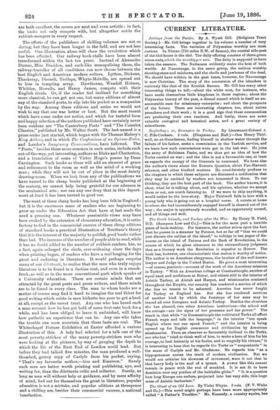The Greek Islands, and Turkey after the War. By Henry
IL Field, D.D. (Sampson Low and Co.)—This is for the most part a terrible piece of book-making. For instance, the author seizes upon the fact that he passes in a steamer by Patmos, but so far off "that we could just discern the outline of the island," to indulge in ten pages of dis- course on the island of Patmos and the Book of Revelations, in the course of which he gives utterance to the extraordinary judgment that as a literary work the Revelation is superior to Homer. The book has, however, one characteristic that makes it worthy of notice. The author is an American clergyman, the brother of the well-known lawyer and Judge in the United States. He gives a most interesting —of course, patriotic—account of the work of the American missions in Turkey. " With an American college at Constantinople, another of equal rank and usefulness at Beirut, and others still in the interior of Asiatic Turkey, at Aintab and Harput, and missionaries scattered throughout the Empire, our country has rendered a service of which she has no reason to be ashamed. America has never fought for Turkey as England has. Bat she has rendered services of another kind by which the footsteps of her sons may be traced all over European and Asiatic Turkey. Besides the churches she has planted, two other American institutions—the school and the cottage—are the signs of her presence and her power." The
result is, that while "in Constantinople the cultivated Turks all affect French ways and talk the language," in the interior "ten speak English where one can speak French," and the interior is being opened up for English commerce and civilisation by American missionaries. From an observer so favourably inclined to the Turks,
one who has " tried to think well of him, to make a hero of him for his courage, to look leniently at his faults, and to magnify his virtues," it is interesting to hear that he regards the Turks as " unspeakable " in the sense of Carlyle and Mr. Gladstone. He regards him " as a
hippopotamus across the track of modern civilisation. Bat we would not criticise his slowness of movement, were it not that in that heavy body is the soul of a tyrant. A power like this cannot remain in peace with the rest of mankind. It is not fit to have dominion over any portion of the habitable globe." " It is a question how long Europe can endure, projected into her very side, this huge mass of Asiatics barbarism."




































 Previous page
Previous page